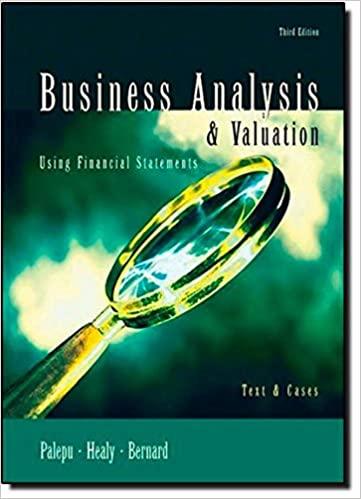Answered step by step
Verified Expert Solution
Question
1 Approved Answer
Chapter 3 Problem 1 5 Joshua & White Technologies: December 3 1 Balance Sheets ( Thousands of Dollars ) Assets 2 0 1 8 2
Chapter
Problem
Joshua & White Technologies: December Balance Sheets
Thousands of Dollars
Assets
Cash and cash equivalents $ $
Shortterm investments
Accounts Receivable
Inventories
Total current assets $ $
Net fixed assets
Total assets $ $
Liabilities and equity
Accounts payable $ $
Accruals
Notes payable
Total current liabilities $ $
Longterm debt
Total liabilities $ $
Common stock
Retained Earnings
Total common equity $ $
Total liabilities and equity $ $
Joshua & White Technologies December Income Statements
Thousands of Dollars
Sales $ $
COGS except excluding depr. and amort.
Depreciation and Amortization
Other operating expenses
EBIT $ $
Interest Expense
EBT $ $
Taxes
Net Income $ $
Common dividends $ $
Addition to retained earnings $ $
Other Data
Yearend Stock Price $ $
# of shares Thousands
Lease payment Thousands of Dollars $ $
Sinking fund payment Thousands of Dollars $ $
Ratio Analysis Industry Avg
Liquidity Ratios
Current Ratio
Quick Ratio
Asset Management Ratios
Inventory Turnover Total COGSInventories
Days Sales Outstanding
Fixed Assets Turnover
Total Assets Turnover
Debt Management Ratios
Debt Ratio Total debttoassets
Liabilitiestoassets ratio
Timesinterestearned ratio
EBITDA coverage ratio
Profitability Ratios
Profit Margin
Basic Earning Power
Return on Assets
Return on Equity
Market Value Ratios
Earnings per share NA
Pricetoearnings ratio
Cash flow per share NA
Pricetocash flow ratio
Book Value per share NA
Markettobook ratio
a Has Joshua & White's liquidity position improved or worsened? Explain.
b Has Joshua & White's ability to manage its assets improved or worsened? Explain.
c How has Joshua & White's profitability changed during the last year?
d Perform an extended Du Pont analysis for Joshua & White for each year.
ROE PM x TA Turnover x Equity Multiplier
e Perform a common size analysis. What has happened to the composition
that is percentage in each category of assets and liabilities?
Common Size Balance Sheets
Assets
Cash and cash equivalents
Shortterm investments
Accounts Receivable
Inventories
Total current assets
Net fixed assets
Total assets
Liabilities and equity
Accounts payable
Accruals
Notes payable
Total current liabilities
Longterm debt
Total liabilities
Common stock
Retained Earnings
Total common equity
Total liabilities and equity
Common Size Income Statements
Sales
COGS except excluding depr. and amort.
Depreciation and Amortization
Other operating expenses
EBIT
Interest Expense
EBT
Taxes
Net Income
f Perform a percent change analysis.
Percent Change Balance Sheets
Assets vs
Cash and cash equivalents
Shortterm investments
Accounts Receivable
Inventories
Total current assets
Net fixed assets
Total assets
Liabilities and equity vs
Accounts payable
Accruals
Notes payable
Total current liabilities
Longterm debt
Total liabilities
Common stock
Retained Earnings
Total common equity
Total liabilities and equity
Percent Change Income Statements vs
Sales
COGS except excluding depr. and amort.
Depreciation and Amortization
Other operating expenses
EBIT
Interest Expense
EBT
Taxes
Net Income
What does this tell you about the change in profitability and asset utilization?
Step by Step Solution
There are 3 Steps involved in it
Step: 1

Get Instant Access to Expert-Tailored Solutions
See step-by-step solutions with expert insights and AI powered tools for academic success
Step: 2

Step: 3

Ace Your Homework with AI
Get the answers you need in no time with our AI-driven, step-by-step assistance
Get Started


